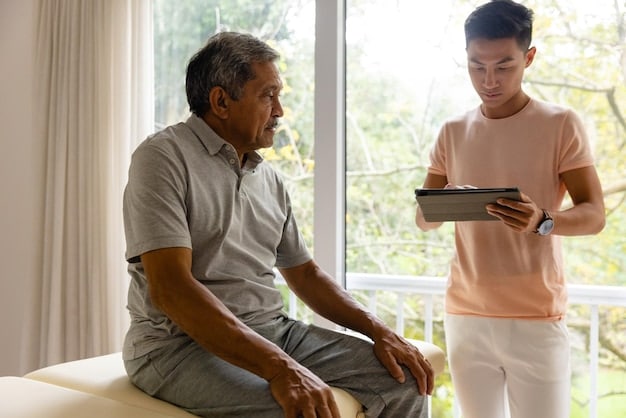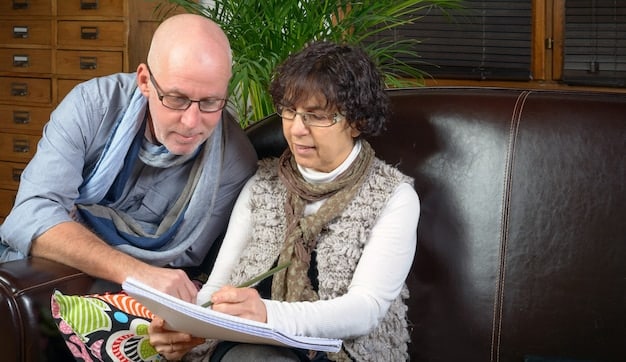7 Essential Caregiver Skills to Master in 3 Months

Mastering 7 essential skills—communication, empathy, problem-solving, time management, self-care, adaptability, and cultural sensitivity—is crucial for caregivers to provide quality support and improve their overall well-being within the next 3 months.
Are you a caregiver looking to enhance your abilities and provide the best possible care? Mastering the right skills can make a significant difference, both for those you care for and for your own well-being. Let’s explore 7 essential skills every caregiver needs to master in the next 3 months to become a more effective and fulfilled caregiver.
Communication Skills
Effective communication is the cornerstone of quality caregiving. It’s not just about talking; it’s about truly listening and understanding the needs and concerns of the person you’re caring for.
Strong communication allows you to build trust, resolve conflicts, and advocate effectively.
Verbal Communication
Clear and concise verbal communication is essential. Use simple language and avoid jargon. Always speak respectfully and patiently.
Non-Verbal Communication
Pay attention to body language, facial expressions, and tone of voice. These non-verbal cues can provide valuable insights into the person’s emotional state.
- Active Listening: Focus intently on what the person is saying, both verbally and non-verbally.
- Empathy: Show that you understand and share their feelings.
- Patience: Allow them to express themselves fully without interruption.

Communication also involves knowing how to communicate with other healthcare professionals, family members, and support networks. Keeping everyone informed and working together is vital for comprehensive care.
Improving communication skills can lead to fewer misunderstandings, better health outcomes, and a stronger bond between caregiver and care recipient.
Empathy and Compassion
Empathy and compassion are the heart of caregiving. These qualities enable you to understand and share the feelings of the person you care for, fostering a supportive and nurturing environment.
Empathy isn’t just feeling sorry for someone; it’s about putting yourself in their shoes and understanding their perspective.
Showing Compassion
Compassion involves acting on your empathy. It means taking steps to alleviate suffering and improve the person’s quality of life.
Building Trust
Empathy and compassion build trust, which is essential for creating a strong caregiver-care recipient relationship. Trust allows the person to feel safe, valued, and respected.
- Validating Feelings: Acknowledge and validate their emotions.
- Offering Support: Provide emotional support and encouragement.
- Patience: Understand that they may be going through a difficult time.
Practicing empathy can reduce caregiver burnout and improve overall well-being. When you connect with the person you’re caring for on an emotional level, you’re more likely to find meaning and purpose in your role.
Strive to bring empathy and compassion to every interaction. This will not only benefit the person you’re caring for but also enrich your own life.
Problem-Solving Abilities
Caregiving often involves navigating complex and unexpected challenges. Strong problem-solving abilities are essential for addressing these issues effectively and ensuring the best possible outcomes.
Problem-solving isn’t about having all the answers; it’s about knowing how to find them and make informed decisions.
Identifying Issues
The first step in problem-solving is identifying the issue. This requires careful observation and assessment. What are the specific challenges or concerns?
Finding Solutions
Once you’ve identified the issue, brainstorm potential solutions. Consider all available resources and options. Consult with other healthcare professionals or family members if needed.
Decision-Making
Make informed decisions based on the available information. Weigh the pros and cons of each option and choose the one that best addresses the issue.
- Critical Thinking: Analyze situations objectively and identify potential solutions.
- Resourcefulness: Utilize available resources effectively.
- Flexibility: Adapt to changing circumstances and unexpected challenges.

Effective problem-solving can prevent minor issues from escalating into major crises. It also empowers you to advocate for the person you’re caring for and ensure their needs are met.
By developing your problem-solving abilities, you can confidently address the many challenges that caregiving presents.
Time Management
Time management is crucial for caregivers who often juggle multiple responsibilities. Effective time management helps reduce stress, improve productivity, and ensure that all important tasks are completed.
Good time management isn’t about doing more; it’s about doing what’s important more efficiently.
Prioritization
Prioritize tasks based on their urgency and importance. What needs to be done immediately, and what can wait?
Scheduling
Create a daily or weekly schedule that includes all important tasks and appointments. Be realistic about how much time each task will take.
Organization
Stay organized by keeping track of medications, appointments, and other important information. Use tools like calendars, planners, or digital apps.
- Setting Boundaries: Learn to say no to additional commitments when necessary.
- Delegation: Delegate tasks to others when possible.
- Breaks: Schedule regular breaks to prevent burnout.
Effective time management can free up valuable time for self-care and other important activities. It also ensures that the person you’re caring for receives the attention and support they need.
By implementing good time management strategies, you can create a more balanced and sustainable caregiving routine.
Self-Care Strategies
Self-care is not selfish; it’s essential for maintaining your physical and emotional well-being as a caregiver. Neglecting self-care can lead to burnout, stress, and other health problems.
Self-care is about taking proactive steps to care for your own needs so you can continue to provide quality care to others.
Physical Health
Prioritize your physical health by eating nutritious meals, getting regular exercise, and getting enough sleep. Make time for activities you enjoy.
Emotional Health
Take care of your emotional health by practicing stress-reduction techniques, such as meditation, yoga, or deep breathing. Connect with friends and family for support.
Setting Boundaries
Set boundaries to protect your time and energy. Learn to say no to additional commitments when you need to prioritize your own needs.
- Respite Care: Utilize respite care services to take breaks from caregiving.
- Support Groups: Join a support group to connect with other caregivers and share experiences.
- Hobbies: Pursue hobbies and interests that bring you joy and relaxation.
Prioritizing self-care can improve your mood, reduce stress, and increase your resilience. It also allows you to provide better care to the person you’re caring for.
Make self-care a regular part of your routine, and you’ll be better equipped to handle the demands of caregiving.
Adaptability and Flexibility
Caregiving is unpredictable, and situations can change rapidly. Adaptability and flexibility are essential for navigating these changes and providing consistent care.
Being adaptable means being able to adjust your plans and strategies as needed to meet the evolving needs of the person you’re caring for.
Responding to Change
Be prepared to respond to unexpected changes in the person’s health, behavior, or environment. Stay calm and adaptable.
Adjusting Plans
Be willing to adjust your plans and schedules as needed. Flexibility is key to managing the unpredictable nature of caregiving.
Learning New Skills
Be open to learning new skills and techniques. The field of healthcare is constantly evolving, and staying informed is important.
- Open-Mindedness: Approach new situations with an open mind.
- Problem-Solving: Use your problem-solving skills to address challenges.
- Patience: Understand that change takes time and effort.
Adaptability allows you to handle crises effectively and maintain a stable and supportive environment. It also reduces stress and improves your overall well-being.
Cultivate adaptability by embracing change and viewing challenges as opportunities for growth.
Cultural Sensitivity
When caring for individuals from diverse backgrounds, cultural sensitivity is vital. Understanding and respecting cultural differences can enhance the quality of care and promote trust.
Cultural sensitivity involves recognizing and appreciating the values, beliefs, and practices of different cultures.
Understanding Beliefs
Learn about the person’s cultural beliefs and practices related to health, wellness, and caregiving. Respect their preferences and customs.
Communication Styles
Be aware of different communication styles and adapt your approach accordingly. Some cultures may value direct communication, while others prefer indirect methods.
Dietary Needs
Consider dietary needs and restrictions based on cultural or religious beliefs. Provide culturally appropriate meals and snacks.
- Education: Educate yourself about different cultures and traditions.
- Respect: Show respect for the person’s cultural identity.
- Communication: Communicate openly and respectfully about cultural differences.
Cultural sensitivity can improve communication, build trust, and enhance the overall caregiving experience. It also promotes inclusivity and respect for diversity.
Strive to provide culturally competent care that honors the person’s unique background and identity.
By focusing on communication, empathy, problem-solving, time management, self-care, adaptability, and cultural sensitivity, caregivers can significantly enhance their skills and provide the best possible care.
| Key Skill | Brief Description |
|---|---|
| 🗣️ Communication | Clear and empathetic communication to understand and address needs. |
| ❤️ Empathy | Demonstrating compassion and understanding the feelings of the care recipient. |
| ⏰ Time Management | Effectively managing time to balance caregiving duties and personal well-being. |
| 🌱 Self-Care | Prioritizing personal health and wellness to avoid burnout and provide better care. |
Frequently Asked Questions
▼
Empathy is arguably the most crucial skill. It allows caregivers to understand and share the feelings of those they care for, fostering a supportive and trusting relationship, ultimately improving the quality of care provided.
▼
Caregivers can improve by practicing active listening, using clear and simple language, and paying attention to non-verbal cues. Taking communication courses or workshops can also provide valuable insights and techniques.
▼
Self-care prevents burnout and helps caregivers maintain their physical and mental well-being. By taking care of themselves, caregivers can provide better, more compassionate care to others, ensuring sustainability.
▼
Strategies include prioritizing tasks, creating a daily schedule, delegating responsibilities when possible, and setting realistic goals. Using tools like calendars and planners can also help stay organized and on track with tasks.
▼
Cultural sensitivity enhances the caregiving experience by promoting trust, respect, and understanding between caregiver and care recipient. Considering cultural beliefs and practices ensures care is tailored to meet individual needs.
Conclusion
Mastering these seven essential skills within the next three months is crucial for caregivers aiming to enhance their effectiveness and well-being. By focusing on communication, empathy, problem-solving, time management, self-care, adaptability, and cultural sensitivity, caregivers can provide high-quality support and create a more fulfilling caregiving experience, benefiting both themselves and those they serve.





